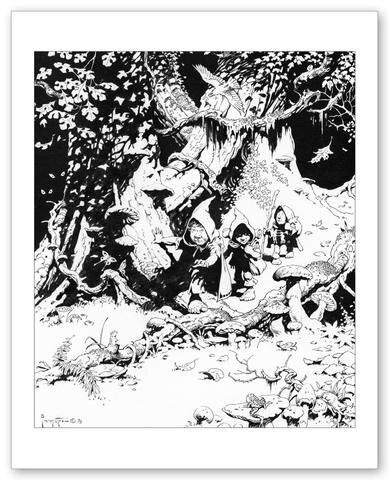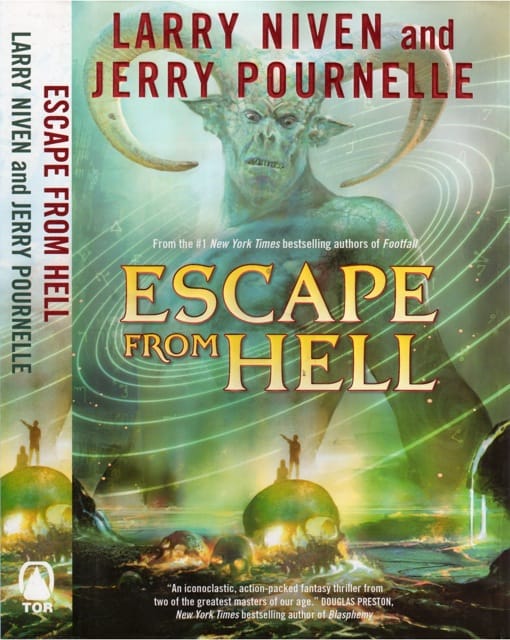The Long View 2007-12-19: Tradition; Kenosis; CBC on Neuhaus; Laws of Nature; Hobbits

Hobbits by Frank Frazetta
John makes an off-hand comment here that helps to illustrate why it was so hard to figure what my taste in fiction was:
In principle, The Lord of the Rings is the sequel to The Hobbit. Tolkien's publishers thought they had commissioned another nice little children's book. Tolkien's correspondence suggests their ill-concealed dismay when he came to them ten years later with this mountain of paper that belonged to no literary genre known to human man. (Well, Tolkien pointed out that it was actually a prose romance, which is an acute point, but have you ever try to real Le Morte D'Arthur all the way through?)
It is absolutely untrue that The Lord of the Rings didn’t fit into the existing literary landscape of the mid-twentieth century, but John honestly didn’t know otherwise. How everyone came to think that is an interesting story that needs to be more widely shared. Tolkien absolutely knew what he was doing, which can be plainly seen by his insistence that LotR was a romance, and not a novel.
Tradition; Kenosis; CBC on Neuhaus; Laws of Nature; Hobbits
US News & World Report notes a Return to Tradition in its cover story about trends in American religion. Predictably, it favors the modest but photogenic revival of the Tridentine Latin Mass, but also covers the fashion among evangelicals for turning worship services into liturgies, as well as the reemphasis of Hebrew in Conservative Judaism and the growing vigor of Orthodox Judaism. The concept for the article is really a round hole into which the square peg of American Islam does not fit, but the piece tries gamely to fit it. In any case, the article makes a point that I have been repeating a tedious number of times, in this and other contexts:
Put simply, the development is a return to tradition and orthodoxy, to past practices, observances, and customary ways of worshiping. But it is not simply a return to the past—at least not in all cases. Even while drawing on deep traditional resources, many participants are creating something new within the old forms. They are engaging in what Penn State sociologist of religion Roger Finke calls "innovative returns to tradition."
I go to a Latin Mass myself, but I have a lively sense that the revival is not a return to the 1950s. The past is a resource; it isn't a destination.
* * *
What's a kenosis, you ask? Well, maybe you don't. Anyway, I came across the idea in a theological context, but it seems a suitable reflection on the end of the year:
Theodor H Gaster has pointed out two basic movements in rituals. The first he refers to as rituals of Kenosis, or emptying; the other, as rituals of Plerosis, or filling. Rituals of Kenosis portray the evacuating of the meaning of time as it approaches the end of a cycle. The wearing down of time at this moment produces noxious and defiling effects, and thus the appropriate response is an ascetic form of behavior accompanied with austerities. In the rituals of Plerosis, the filling of time or the beginning again of the new time, dramas of excess and overabundance of power are portrayed in the rituals. Specific dramatic roles in these rituals imitate the power of deities in bringing about the renewal of the time of the cosmos.
Does this have something to do with the difference between comedy and tragedy? Even Northrop Frye missed this one.
* * *
Speaking of theological investigation, the Canadian Broadcasting Corporation recently did a pretty good report on Fr. Richard John Neuhaus, which was taped in part at his office at First Things. You can view the piece here. The hook for the BBC report, of course, is that Fr. Neuhaus was born in Ontario, so in part it's a story about a local boy who made good. Still, the report casts doubt on the resources the CBC has to report this kind of story. What possessed them to keep running the Latin chant background music during the part about Neuhaus's early life as a Lutheran? Is there not a single track of Ein Fester Burg Ist Unser Gott in the CBC audio library?
First Things itself, we must note, was once a reasonably respectable publication, but now it has started a scandal sheet.
* * *
Here's a New York Times headline for you: Laws of Nature, Source Unknown. The article, by By Dennis Overbye, was sparked by this observation by a noted physicist and publicist:
Dr. Davies asserted in [an] article that science, not unlike religion, rested on faith, not in God but in the idea of an orderly universe. Without that presumption a scientist could not function. His argument provoked an avalanche of blog commentary, articles on Edge.org and letters to The Times, pointing out that the order we perceive in nature has been explored and tested for more than 2,000 years by observation and experimentation.
The Overbye piece is a leisurely tour of Platonism among scientists today, as well as the popularity of the various versions of It from the Bit. I am not quite sure why the author thinks quantum uncertainty is an argument against Platonism; surely no theory was ever more trustful of pure ideas. As for the theological implications of all this, I might suggest that the God of classical theology is just another way of saying that the self-reference problem that any world-explanation will generate is a feature, not a glitch. The real mystery, though, is where this "2000 years" comes from. Rather, I know where it comes from, but it has nothing to do with the history of science, yet it is used throughout the article.
* * *
The film version of The Hobbit may actually be better than that of The Lord of the Rings, since the story is of more manageable size and the fans are not so fanatically demanding. But look:
Academy Award-winning filmmaker Peter Jackson; Harry Sloan, Chairman and CEO, Metro-Goldwyn-Mayer Studios Inc. (MGM); Bob Shaye and Michael Lynne, Co-Chairmen and Co-CEOs of New Line Cinema have jointly announced today that they have entered into the following series of agreements:
* MGM and New Line will co-finance and co-distribute two films, ?The Hobbit? and a sequel to "The Hobbit." New Line will distribute in North America and MGM will distribute internationally. ...Principal photography is tentatively set for a 2009 start, with the intention of "The Hobbit" release slated for 2010 and its sequel the following year, in 2011...
In principle, The Lord of the Rings is the sequel to The Hobbit. Tolkien's publishers thought they had commissioned another nice little children's book. Tolkien's correspondence suggests their ill-concealed dismay when he came to them ten years later with this mountain of paper that belonged to no literary genre known to human man. (Well, Tolkien pointed out that it was actually a prose romance, which is an acute point, but have you ever try to real Le Morte D'Arthur all the way through?)
As things stand, the sequel here will have to be an entirely new work. There is more than enough material in The Rings about the gap between The Hobbit and The Rings to put together a respectable story. I have not been following the publication of Tolkien's unfinished works, but I would not be surprised if a an outline for a plot already exists.
I do hope the new story includes a visit to the Old Forest. That episode was missing from Jackson's film version of The Rings, for understandable reasons of time, but it was one of my favorite parts of the book.
Copyright © 2007 by John J. Reilly
Support the Long View re-posting project by downloading Brave browser, and then trying it out. With Both Hands is a verified Brave publisher, you can leave me a tip too!



Comments ()